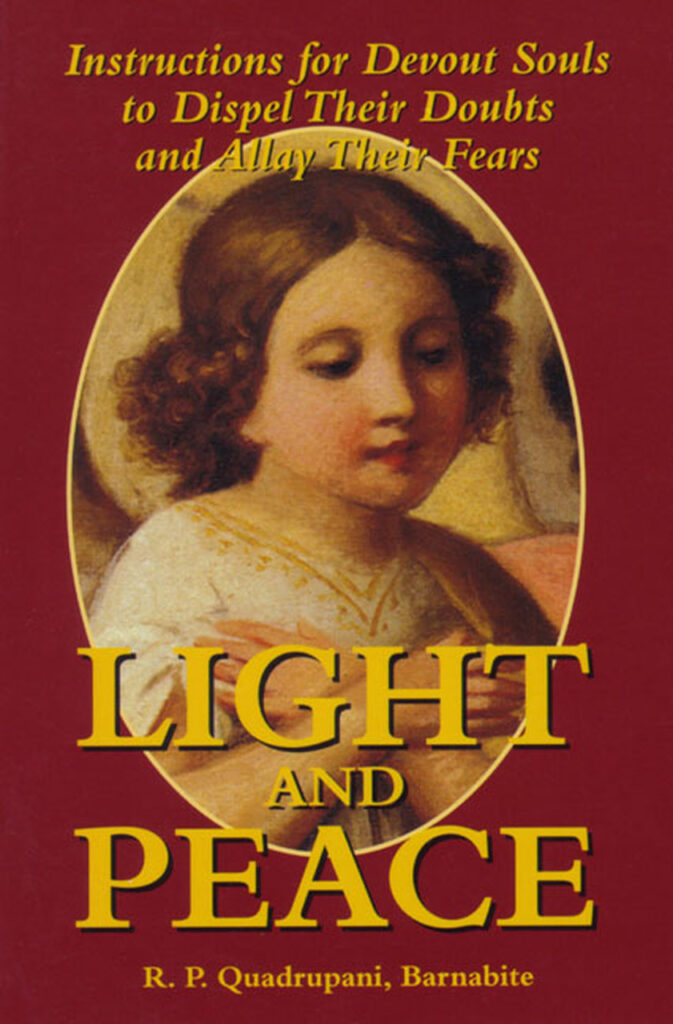“I said: I will confess against myself my injustice to the Lord, and thou hast forgiven the wickedness of my sin.”
-Ps. 31:5
The sacrament of penance is a sacrament of mercy. We should therefore approach it with confidence and in peace. Saint Francis de Sales assures us that for those who go to confession once a week a quarter of an hour is enough for the examination of conscience, and a still shorter time for exciting contrition. Not even this much is necessary, he adds, for those who confess more frequently.
Faults omitted in confession either because they were forgotten or because they seemed too trivial to mention, are nevertheless effaced by the absolution. St. Francis de Sales has this to say on the subject: “You must not feel worried if you cannot remember your sins when preparing for confession, for it is incredible that anyone who often examines her conscience would overlook or be unable to recall such faults as are important. Neither should you be so keenly anxious to mention every minute imperfection, every trifling fault; it is enough to speak of these to our Lord, with a sigh of regret and a humble heart, whenever you remark them.”
And do not imagine in consequence that you are guilty of secret sins which you are hiding from your confessor. This fear is an artifice made use of by the devil to disturb your peace of mind.
“You must not be so anxious to tell everything, nor to run to your superiors to make a great ado over each little thing that troubles you and that will, perhaps, be forgotten in a quarter of an hour. We must learn to bear with generosity these trifles which we cannot remedy, for ordinarily they are only the consequences of our imperfect nature. That your will, feelings, and desires are so inconstant; that you are at one time moody, at another cheerful; that you now have a wish to speak, and presently feel the greatest aversion to do so; and a thousand similar insignificant matters are infirmities to which we are naturally prone and will be subject to as long as we live…. It is needless to accuse yourself in confession of those fleeting thoughts that like gnats swarm around you, or of the disgust and aversion you feel in the observance of your vows and devotional exercises, for these things are not sins, they are only inconveniences, annoyances.” -St. Francis de Sales
Rest assured that the more closely you examine your conscience the less you will discover that is worth the trouble of telling. Moreover, you must remember that too long an examen fatigues the mind and cools the fervor of the heart.
To those who in their confessions are inclined to confuse involuntarily movements with sins, Saint Francis de Sales gives the following useful advice:
“You tell me that when you have experienced a strong feeling of anger, or have had any other temptation, you are always uneasy if you do not confess it. When you are not sure that you have given consent to it, I assure you it is unnecessary to mention it except it may be in spiritual conference, and then not by way of accusation, but to obtain advice how to behave another time in like circumstances. For if you say: I accuse myself of having had movements of violent anger for two days, but I did not give way to them, you are telling your virtues, not your sins. A doubt comes into my mind, though, that I may have committed some fault during the temptation. You must consider maturely if this doubt have any foundation in fact, and if so, speak of the matter in confession with all simplicity; otherwise it is better not to mention it, as you would do so only for your own satisfaction. Even should this silence cost you some pain, you must endure it as you would any other to which you can apply no remedy.”
“Omit from your confessions”—we again quote the same Saint—“those superfluous accusations which so many persons make merely through habit: I have not loved God sufficiently; I have not prayed with enough fervor; I have not loved my neighbor as much as I should; I have not received the Sacraments with all the reverence due to them; and others of a like nature. You will readily see the reason for this. It is that in speaking thus you tell nothing particular that would make known to the confessor the state of your conscience, and because the most perfect man living, as well as all the saints in Paradise might say the same things were they making a confession.”
Those who go to confession frequently should always bear in mind what the saintly director says in addition:
“We are not obliged to confess our venial sins, but if we do so it must be with a firm resolution to correct them, otherwise it is an abuse of the sacrament to mention them.”
After confession keep your soul in peace, and be on your guard—this is a point of cardinal importance—against giving access to any fear about the validity of the sacrament, either as regards the examination of conscience, the contrition, or anything else whatsoever. These fears are suggestions of the devil whose aim it is to instill bitterness into a sacrament of consolation and love.
This article is taken from a chapter in Light and Peace by R. P. Quadrupani, Barnabite which is available from TAN Books.









